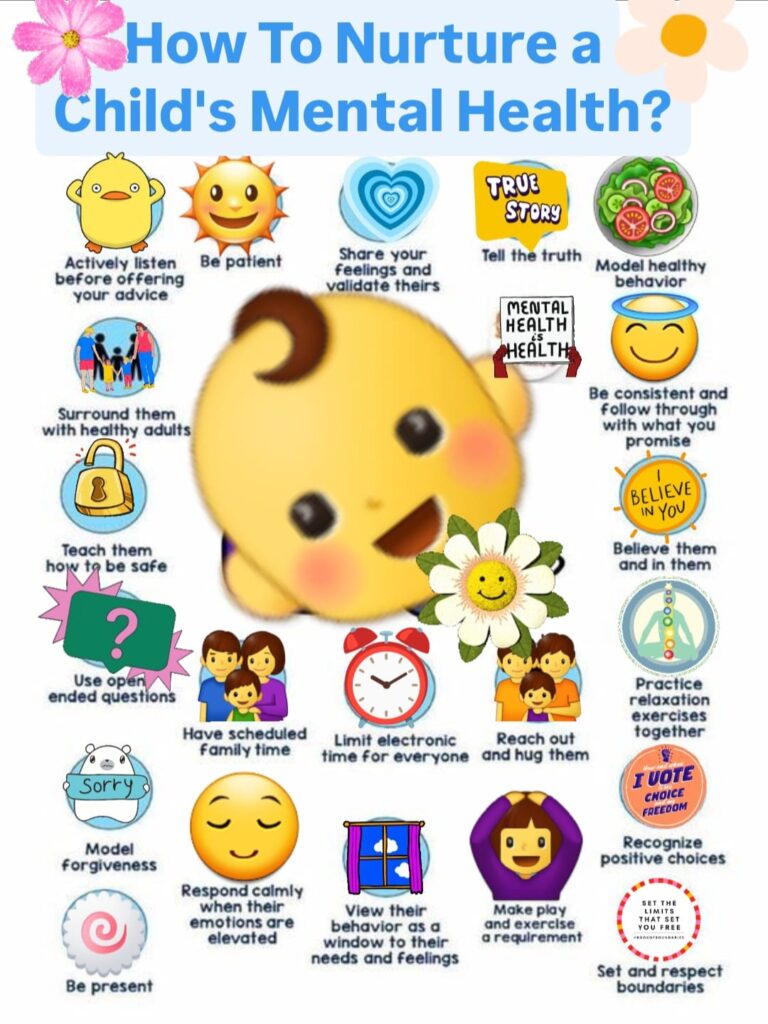
One evening, after a long day at school, a eight-year-old child, sat down with her mother, visibly upset. Her mom could tell something was wrong, but instead of jumping in with advice, she paused and simply asked, “How was your day?” This small act of listening gave the child, space to share her feelings, and in that moment, her mother modeled one of the simplest but most profound ways to nurture mental health—active listening.
1. Actively Listen Before Giving Advice: Children often need to express their emotions before hearing advice. By listening to them first, you show that their feelings matter, making them feel valued and understood.
2. Surround Them with Healthy Adults: Kids absorb the behaviours and attitudes of those around them. By surrounding them with positive role models, you’re giving them examples of respect, resilience, and kindness.
3. Teach Them How to Be Safe: Safety isn’t just about physical well-being. Teaching your child how to stay emotionally and mentally safe helps them develop boundaries and assertiveness.
4. Use Open-Ended Questions: Instead of yes/no questions, ask open-ended ones like, “How did that make you feel?” This encourages children to think critically and express themselves more deeply.
5. Model Forgiveness: Show your children that everyone makes mistakes, and the important part is learning how to forgive and move forward. This teaches them emotional resilience.
6. Be Present: Put away distractions and be fully present when you’re with your child. Quality time fosters a secure attachment and creates lasting memories.
7. Be Patient: Kids take time to process and understand their emotions. Patience allows them to work through challenges at their own pace, without added pressure.
8. Have Scheduled Family Time: Having regular family activities builds connection and gives your child a safe space to share their thoughts, creating a deeper bond.
9. Respond Calmly When They Are Dysregulated: When children are upset, responding with calm instead of anger helps them learn to regulate their emotions better. Your calm presence teaches them self-soothing techniques.
10. Share Your Feelings and Validate Theirs: By sharing your emotions, you show them it’s okay to be vulnerable. Validating their feelings strengthens their emotional intelligence.
11. Limit Electronic Time for Everyone: Create tech-free zones or times, fostering direct communication and reducing dependency on screens, which can negatively impact mental health.
12. View Their Behaviour as Having Deeper Reasons: Misbehavior often stems from unmet needs or emotions. Looking beyond the surface helps you address the root cause and support your child’s emotional development.
13. Tell the Truth: Being honest with your child builds trust. It’s important to share age-appropriate truths, fostering a sense of security and integrity.
14. Reach Out and Hug Them: Physical affection reassures your child and reduces their stress. Hugs have been proven to release oxytocin, which promotes emotional bonding.
15. Make Play and Exercise a Requirement: Physical activity is not just for health; it also enhances mood and reduces anxiety. Encourage daily exercise through play, sports, or family activities.
16. Model Healthy Behaviour: Children mirror what they see. Modeling healthy habits, like taking care of yourself mentally and physically, teaches them by example.
17. Keep Up Your Promises: Consistency in keeping promises builds trust and security. When you follow through, your child knows they can rely on you.
18. Believe Them: Whether it’s their emotions, experiences, or stories, believing your child validates their perspective and fosters confidence in expressing themselves.
19. Practice Relaxation Together: Teach your child relaxation techniques, like deep breathing or meditation. Doing these together shows them the importance of managing stress healthily.
20. Recognize Positive Choices: Highlight their good decisions, no matter how small. Positive reinforcement helps your child feel capable and encourages more healthy behaviours.
21. Set and Respect Boundaries: Boundaries teach children to respect others while also understanding their own limits. Setting boundaries and respecting theirs is crucial for their emotional health.
Conclusion: Nurturing a child’s mental health is about more than managing behavior—it’s about creating an environment where they feel heard, loved, and safe. By consistently practicing these small, mindful actions, you’re helping your child grow into a resilient and emotionally healthy individual.